Online-Dating Tip #1: Wear Your Teeth

To certain men who hope to attract women via senior online-dating sites: What were you thinking when you chose not to put your teeth in before posing for your photograph? Did you honestly believe that by not smiling you could disguise the fact that your dentures are in a glass beside the bed? Don’t you realize that, without teeth to hold them in place, your lips curl inward around your gums, making you look like a scowling goldfish?
What’s wrong with the people who take your pictures? Why did they let you wear a wifebeater and a pair of sweatpants that don’t quite meet in the middle? And the unshaven look, so fetching on Josh Duhamel, makes an old guy look like he’s been sleeping under a bridge. I have nothing against men who sleep under bridges—we all do what we have to do—but if you can’t afford a razor then you can’t afford to take me dancing, which is the only reason I’m browsing online-dating sites in the first place.
But my real quarrel isn’t with your photograph, although—sunglasses? Seriously? No, what I object to is your written profile.
In my two brief excursions into online dating, I’ve found two types of profiles: (a) the ones that say little or nothing and (b) the ones that say too much.
If you look like Robert de Niro, you can be excused for being a man of few words. If you look like Winston Churchill, you’d better be as interesting as Winston Churchill. But we’ll never know, will we, because all you’ve said about yourself is that you like to watch football on TV. Be still, my heart.
Here are some excerpts from actual profiles, along with probable translations:
- Must be willing to let loose and have fun—life is too short at this stage. (Plan on putting out by the third date.)
- My idea of a great evening is sitting by the fire just to watch it snap and hear it crackle. (Can’t afford to take you dancing.)
- I love younger women that like to do spontaneous things, in shape and free. (Plan on putting out by the second date.)
- Would like to find someone who accepts me and my family. (Deadbeat son still lives at home.)
- Can’t travel much because I have to take care of the hogs. (No translation necessary.)
- I’m a romantic, still searching for that special someone. (Seeking a partner with a pulse.)
- I do cook. I love conversation over cocktails and appetizers, or coffee and pastries. (Plan on gaining ten pounds by the third date.)
- I am interested in old cars and do own one. I’m in a club and am active with a club. (Brush up on carburetors.)
- Enjoy golf spectator sports fishing and cooking. There are many other interests that I have but you will just have to wait and find out later. (Into S&M. Not into punctuation.)
Gentlemen! You don’t need to specify a woman “with height and weight proportional.” Just look at my photograph. If I’m too thin or too chubby for your taste, move on. And don’t tell me you’re “an intellectual.” Admitting that you like to read Nietzsche or Sartre will give me all the information I need on that score.
My guess is that there are quite a few more women than men on these sites, which is why the guys think they can get away with showing off their belly hair and still attract a “proportional” woman who will tag along to the car show or help them slop the hogs.
My advice: Lighten up! I’m already halfway in love with the guy who wrote, “I will warn you that I dance like a fool at weddings. Really. I will embarrass you. But if I do my job right, you’ll be laughing too much to care.” Sadly, he’s only half my age. But maybe, if I do my job right, he’ll be laughing too much to care.
Big-Money Blogging

The Minuet, Giovanni Domenico Tiepolo, 1756
There’s a 28-year-old woman who makes more money in a year than I’ve made in my entire life. I learned about her on YouTube. She brings in over a hundred thousand dollars a week blogging and freelance-writing about personal finance. She and her husband travel the country in their mega-motorhome. I want her life. So why don’t I have it?
(a) I have a blog.
(b) I can write.
(c) Everything I know about personal finance can be summarized in five words: “Don’t do what I do.”
I’ve got (a) and (b) working for me, but (c) is a deal-breaker. And I might have to revisit (b). Yes, I can write, but I don’t talk the talk of the blog-reading public. I’m not 28 years old. I’m twice 28 years old plus quite a few more years. I speak Baby-Boomer English in a Millennial world.
The dude who profiled this woman on YouTube—we’ll call them “Joe” and “Daphne”—described her success by saying that “she’s crushing it.” That’s Millennial-speak for “she’s doing well.”
I googled “Millennial-speak” to get an idea of just how hip I’m not. According to one of the articles my search turned up…
- If I’m in a bad mood, Millennially-speaking, I’m “salty.”
- If I want something—anything—a lot, I’m “thirsty.”
- If I’m rude to someone online, I’m a “troll.”
- If my lifestyle is ho-hum, it’s “basic.”
- If I need to leave in a hurry, I have to “bounce.”
Back in the day, salty referred to salinity, thirsty meant “in need of hydration,” a troll was a gnome who lived under a bridge (or a human who looked like a gnome who lived under a bridge), basic was synonymous with “fundamental,” and bouncing was something you did on a bed. And this accounts for only five out of dozens, maybe hundreds of words I’m using wrong. But if I tried to adopt Joe and Daphne’s vocabulary, I’d sound like an idiot. Besides, I’ve never been hip, not even when hipness was hip. The only dance I ever mastered was the minuet. When I try to high-five someone, I miss their hand and lurch into a wall.
I watched another YouTube video on making big bucks through freelance writing. A very hip Millennial chick I’ll call “Tawny” made it clear that I shouldn’t settle for earning an effing ten cents a word writing for an effing content mill—a website that churns out online articles. That’s another thing that differentiates me from Millennials: their comfort level with the F-word.
Understand, I’m perfectly capable of spewing F-words in emergencies, and I’ve been heard to say, “Eff YOU,” when I’m, well, salty and someone pushes my buttons, but if I were marketing professional services on a YouTube video, I wouldn’t use the F-word unless it related directly to the type of service I was promoting. If you get my drift.
So good luck, Joe, Daphne, and Tawny. You’re safe from me… at least until I figure out a way to make money blogging about stress incontinence or involuntary public farting. Meanwhile, chicks and dudes, I gotta bounce. See you later, alligator.
Shall We Say ‘Shall’?

Shall we dance?
Who uses the word shall these days? In American English, at least, many of us say will or should, have to, ought to, or need to when our ancestors would have used shall:
- AS A COMMAND: You shall pick up your toys and put them away.
- FOR SIMPLE FUTURITY: When shall we expect you?
- TO EXPRESS AN INTENTION: We shall have to prepare for the storm.
- TO EXPRESS A STRONG ASSERTION: We shall survive.
- IN CERTAIN QUESTIONS: Shall we have chicken or fish?
Shall is still formally used in laws and rules:
- No one shall enter these premises between 10 p.m. and 6 a.m.
Do you think that shall is archaic? To modern ears it might sound stuffy or old-fashioned… yet, though we’re not aware of it, some of us use shall quite often, though in an abbreviated form, pronouncing it like “sh’l” or omitting the L-sound altogether:
- Where sh’l we go for lunch?
- What sh’ we have for dinner?
Shall in its full form survives even in colloquial speech in suggestions such as
- Shall we go?
- Shall we dance?
Traditionally, in the future tense, shall was used in the first person, will in the second and third persons:
- SINGULAR: I shall, you will, he/she/it will
- PLURAL: We shall, you will, they will
I suspect, though I have no solid evidence, that British speakers of English use shall more frequently than Americans.
Sources
About That Itemthing…
A Bad-Hair Day
I like to think that I have some facility with the English language—reading and writing, understanding and communicating, teaching and even giving mildly humorous presentations to small groups of people who are easily entertained—in short, I am a capable English-language writer and speaker, and I can even curse an eloquent blue streak when the occasion calls for it. (See, for example, “The F-Word: A User’s Guide.”)
Other people tell me I write well. In fact, they pay me to say things for them. They ask me to write something about how they have a great product and they think everybody should buy it. A few days later, I email them a draft that says, basically, “We have a great product and we think everybody should buy it.” Within minutes I get an email response that says, “You’re a genius! I don’t know how you do it! Here’s two hundred dollars.” I email back, “Thank you. Any time. Really.”
But, for all my skill and experience, I am at a loss to decipher this brief missive from the eBay seller who mailed me a dark-brown wig when I had ordered a blond one some weeks back.
Dear customer,
Thanks for your time and message. There are so many items need to be dispatched resently
which is out of your imagination, maybe our sending department made a mistake, please accept our sincerest apologies. we have contacted Logistics center, ask about the itemthing. The shipping center informed me that the item was out of stock, as for the issue,we would like give you a full refund first, when we have stock, we will immediately contact your. How about that? we will contact our product department, find similar styles of wigs,i f we have similar styles, we will contact your.
your satisfaction is all we concern. Please let us know.
Wait for your kind reply
Really sorry for any inconvenience.
Best regards
Before you accuse me of making sport with persons whose native language is manifestly other than English, realize that if you are a native-English-speaker and you write me a silly letter, I will cheerfully make sport with you, too, and that very soon, probably later tonight, I will be making sport with English-speaking men who publish silly profiles on online-dating sites. Furthermore, you may consider this an open invitation to make sport with me when I unintentionally write, say, or do something laughable. And be assured that I have nothing but respect for the wig-seller, who is gracious (and practical) enough to communicate with me in English rather than requiring me to learn whichever of the hundreds of dialects in the five main Chinese dialectical groups she customarily uses.
Still and all—I’m not sure how to proceed, and it seemed more expedient to ask for other sets of eyes to examine the seller’s instructions than to learn Chinese. So what do you think? Since my objective is to get a replacement wig as soon as possible, should I ask for a refund? The itemthing I ordered is out of stock, but does she have similar styles? How extensive is her inventory—a few wigs, a few dozen, or a number out of my imagination? How likely is it that her sending department, having maybe made one mistake, will maybe make another mistake when I reorder? Perhaps I should explore the inventories of other vendors. How about that?
If I really want the skinny on these wigs, there’s always the learning-to-speak-Chinese route, but I suspect that the difficulty is at least as great as that of learning Japanese and that Dave Barry says no more than the truth when he writes that the best way to learn Japanese is “to be born as a Japanese baby and raised by a Japanese family, in Japan” (Dave Barry Does Japan, 1982). I thought I could hold my own in Spanish until I was humbled by a brief conversational exchange in my doctor’s waiting room, where I am frequently the only English-speaker. Catching the eye of a young woman holding an adorable infant swathed in pink, I asked her, in Spanish, how old her little girl was. “¿Quantos mesas tiene su niñita?” I said. She gave me a small smile and looked away, but the woman on my left leaned toward me and whispered, “You just asked her how many tables her little girl has.” Well, I thought defensively, that could have been what I meant to say. How did she know that I wasn’t a Ph.D. student writing a dissertation on furniture distribution in Spanish-speaking households? Or that I didn’t intuitively sense that her child was a table-collecting sort of baby and simply wondered how many tables she had managed to acquire so far?
It seems impractical to invest weeks, possibly months or years, in learning Chinese so that I can ask an intelligent question about a wig. In the same amount of time I could grow better hair so that I don’t need the stupid wig. On the other hand, Chinese could come in handy if I travel to China or decide on a career in the Foreign Service, even though I turned 70 on my last birthday and the best time to make major vocational choices, especially those with steep learning curves, was probably 1968. True, at under ten dollars the wig was a bargain, but surely there are comparable deals available from English- or Spanish-speakers. The Spanish word for wig is peluca, which is perilously close to peluche (“cuddly toy”), so if you see me walking around with a Teddy bear on my head, try to be polite, okay?
Absent Again
Why I Didn’t Go to Church This Morning

St. Nicolaaskerk Church, Amsterdam, the Netherlands—Huffington Post
Every Saturday night I go to bed early, almost wriggling at the happy thought of waking up Sunday morning, showering a little longer than usual, dressing with a little more ceremony… ready, more than ready, eager for Sunday-morning fellowship, for brief but powerful embraces and heartfelt handshakes, for the well-loved litany, both ancient and evergreen… for the palpably mystical cadence of Scott’s sermon, so delicious to hear that one risks being enchanted by the voice and missing the message… for the brazen presence of Jesus that is somehow gentler than in solitude, if that were possible, among fellow worshipers and even those who have just come for the music… and, of course, for the music. This is my Saturday-evening ritual, and I feel then that I could simply will myself to church on Sunday morning on the strength of that anticipation, arriving without traversing the space between home and sanctuary, taking a literal quantum leap….
This is why Sundays become the saddest hours of my week, why my Sunday-morning ceremony is to bury the bright expectations so recently alive, so suddenly aborted. As free and light as I feel upon falling asleep is as heavy and inert as I feel upon waking, as if I have no agency, as if I am a stone expected to leap from its ages-old tomb beneath a streambed and propel itself to the moon.
Because I am so certain on Saturday night that this Sunday will be different, will signal my reemergence into the world of churchgoers, will witness the arrival that conquers inertia for all time, I am first surprised and then grieved on Sunday morning, every Sunday morning… as if my miscarried purpose were unprecedented, as if all this had never happened before. I wonder what went wrong. I am angry at, disgusted with, exasperated by my inaction. Entropy, I think, is the devil, the real one—horns, tail, pitchfork, and all—and I ponder with genuine bewilderment my body’s failure to obey my will.
For a while, I rationalize. I recall that I am “coming down with something” or “recovering from something.” I remind myself that I can’t afford the Uber expenditure and that I have shown myself too untrustworthy to ask a friend for a ride. I resolve to live more healthfully, to get more exercise, to sleep more soundly, and to manage my money more sensibly… all so I can do the one thing that, above every other, is to me desirable, enjoyable, necessary, and—in theory, at least— attainable: to show up at my beloved church on Sunday morning.
Asparagus regained
The penalty for failure is harsh. I am contrite and the Divine is all-forgiving, but out of the corner of my eye I see God smirking. The Holy Spirit is a faint breeze outside my window. Jesus is patient, but I fancy that he taps his toes. It would be easier to bear if, having failed once again, I could redeem the time with prayer, meditation, or Good Works. I should call my brother, write letters to my inmate correspondents, Skype with my out-of-town friends and grandchildren, ride my bicycle and smile at pedestrians, go to a nearby AA meeting, cook dinner for the friend who brought me food and medicine when I was sick. But I have worn myself out with shame, and torpor has set in. Of all the days of the week, Sunday is the one most likely to be spent playing marathon games of Words with Friends on Facebook, reading a John Grisham novel, or binge-watching The West Wing. I have spent entire Sundays without speaking to another soul, brushing my teeth, or walking to a destination more distant than the bathroom.
Originally there were semi-legitimate reasons for not going to church, but the reasons no longer apply, and all that’s left is remembered distaste and knee-jerk discomfort. When I was a little girl I hated asparagus, and for decades I avoided asparagus as if it were radioactive sludge. In my late twenties, at a banquet, I accidentally got a bit of asparagus on my fork, tasted it, and instantly regretted all those years during which I had deprived myself of asparagus ecstasy. Such is my regret at allowing unpleasant associations to interrupt the joy of churchgoing.

Temple Emanu-El, New York City—Huffington Post
For most of my life I have loved church and churches, but even if I didn’t particularly want to go it would be a Good Thing to do, a smart thing, a generous thing. When I’m not beating myself up, I enjoy my own company, and my pursuits are both solitary and sedentary. In my experience, independence too quickly becomes isolation and profound, toxic loneliness. At seventy years old, I occasionally wonder how much time I have to form good habits, healthful ways of being in the world, mutually beneficial relationships… to become a member of the Good Guys’ Club, that cheerful, active, productive, unofficial association of people who genuinely want to infuse the world with a little more beauty, more compassion, and—on a really good day—more fun. I want to work toward something noble or at least useful; I desire loftier goals than Not Being Depressed. The ambitions and expectations with which I began my adult life no longer call to me. A few have been achieved, but I think that I will never live on a farm, keep honeybees and chickens, or explore the Mississippi River on a houseboat. (I do, however, hold out for a year or two of travel in a mini-motorhome similar to the Chinook in which my boys and I spent many carefree hours.)
A change is gonna come
As to Not Being Depressed, one would think that I, having emerged from a place so blighted that I can conjure neither images nor words to describe it, would be in a state of uninterrupted euphoria. I know that, from that dark prison, I bargained with God, promising that if I were delivered I would be endlessly grateful and unvaryingly kind… that if I could once again stand in the sunlight and place my feet on solid ground, I would ask for nothing more. But we are made for bliss; God doesn’t want us to be satisfied with “comfortably numb.” If there’s a good thing to be said about Sunday guilt, it’s that distress motivates change.
I regard the world and its pain, I consider the relative difficulty of putting on shoes that match and traveling less than twenty blocks in an automobile once a week, and I realize that if I made going to church next Sunday morning the only item on my checklist I could do it. It’s doable, and I can do it. A few phone calls, a conversation, an arrangement… this is not a mission for the NATO Allied Command. Things requiring much greater effort are being done as I write, will be done tomorrow, and I will do some of them. One evening this week I will babysit three-year-old triplets, a task I challenge the NATO Allied Commander to achieve with the skill and energy that I bring to it. When the time comes, I certainly won’t wage an internal debate on whether to show up for the triplets. Such is the strength of simple commitment.
So I think that I will stop wondering why I didn’t go to church this morning—a mental exercise that predictably invites argument—and I will make a simple commitment. I will make that commitment to myself, I will make it to someone else, and I will meet it. I will go to church next Sunday. I will expect that, with my having stayed away, there will be a bit more strangeness in the experience than when I was a reliable churchgoer in a past life and going to church was like reuniting with a large and delightfully eccentric family. I believe I can handle it. Above the strangeness will be the open door; beside it will be the welcome mat. That’s why I choose to go. All are welcome there. And next Sunday I will go to church.

Notre Dame Cathedral, Paris—Huffington Post
Living in a Postbinary World
Every person born into the world represents something new, something that never existed before, something original and unique. —Martin Buber
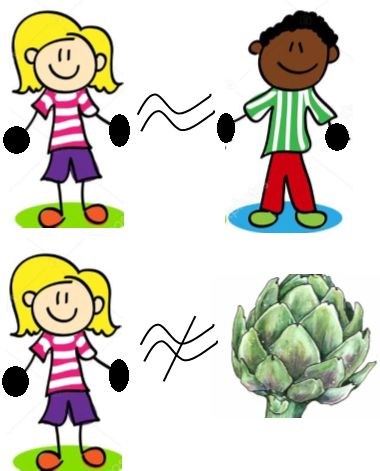 What’s the first thing someone notices about you when you walk into a room? Is it your race? Your gender? An overweight woman on the Dr. Phil Show once insisted that it was obesity. Speaking for myself, more and more as the years flew by I came to believe that it was age. Yet I am now convinced that it is this: I am not a sea urchin or a box of Post Toasties. People might observe my white hair or my pink skin, but only after they discern that I am a human being and not a goat.
What’s the first thing someone notices about you when you walk into a room? Is it your race? Your gender? An overweight woman on the Dr. Phil Show once insisted that it was obesity. Speaking for myself, more and more as the years flew by I came to believe that it was age. Yet I am now convinced that it is this: I am not a sea urchin or a box of Post Toasties. People might observe my white hair or my pink skin, but only after they discern that I am a human being and not a goat.
Try to define something—anything—without comparing it to something else. It’s not possible to make sense of the world, much less describe it, without putting people and things in categories. No two things are precisely the same, but we can’t give every object or idea its own separate name—even if we cheat and use numbers, as in “snowflake 1,” “snowflake 2,” and so forth.
You can categorize people and things all day long, but none of them conforms neatly to the name you give it. As soon as you invent something called a pizza, someone else is creating variations on a pizza, and pretty soon you have a pineapple pizza, a pizzaburger, even pizza soup.
Though each of us is unique, people are much more alike than we are different—compared to artichokes, for example, or honeybees or freight trains. When the invasion from outer space begins, and the aliens resemble flying dumpsters and smell like raw sewage, all our old enemies—the human ones, black or white, rich or poor, old or young—are going to start looking pretty good to us.
About black and white
Recently I listened to the last few minutes of a radio interview about racism. The interviewee was making the point that racism has less to do with individual attitudes than with participation in racist systems.
“It’s not about being a nice person,” she said. Social, educational, financial, political, healthcare, and other institutions are racist through and through, she told us. I wanted her to be wrong; but, just as I was preparing my mental argument, I thought of the criminal-justice system.
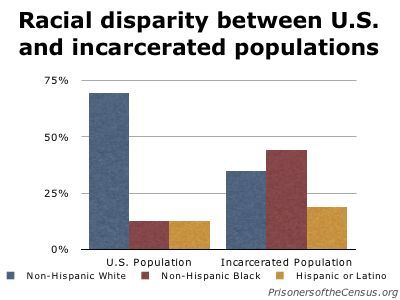 In 2010 (the year of the most recent census), black males made up 40 percent of the total male prison population, white males 39 percent, and Hispanic males 19 percent. On the surface, this looks bad for black men, especially when you consider that African Americans constitute only 13 percent of the U.S. population. Thirteen percent of Americans are committing 40 percent of the crimes, you might hastily (but wrongly) infer, resolving to put as much distance as possible between yourself and black men—large mobs of whom seem intent on stealing your money and raping your daughters.
In 2010 (the year of the most recent census), black males made up 40 percent of the total male prison population, white males 39 percent, and Hispanic males 19 percent. On the surface, this looks bad for black men, especially when you consider that African Americans constitute only 13 percent of the U.S. population. Thirteen percent of Americans are committing 40 percent of the crimes, you might hastily (but wrongly) infer, resolving to put as much distance as possible between yourself and black men—large mobs of whom seem intent on stealing your money and raping your daughters.
It’s true that there are too many black men in prison; arguably, there are too many people of every stripe in U.S. penitentiaries. We not only incarcerate a higher percentage of offenders but also keep them in prison longer than any other country in the world. But the lopsided numbers of black prisoners in this country cannot be explained by the quantity of crimes committed. There are other factors, one of which is mandatory-minimum sentencing laws.
- For certain crimes, the law sets minimum sentences that judges cannot reduce, even when there are extenuating circumstances.
- The most common mandatory minimums relate to federal laws for possession of specific amounts of illegal drugs. For example, convicted of possessing a single gram of LSD or a hundred grams of heroin, you’re looking at five years in prison, no matter how sweetly you apologize.
- The Anti-Drug Abuse Act of 1986 set wildly dissimilar penalties for possession of crack cocaine versus powder cocaine. Five grams of crack cocaine meant at least five years in prison—the same sentence as for five hundred grams of powder cocaine. Put another way, a first-time crack offender (statistically likely to be a black male) was virtually guaranteed a five-year prison sentence, whereas a first-time offender with five grams of powder cocaine would likely get probation.
- According to 2009 data published by the U.S. Sentencing Commission, 79 percent of 5,669 sentenced crack offenders were black, 10 percent were white, and 10 percent were Hispanic.
- In 2016, the Hamilton Project at the Brookings Institution reported that “black and white Americans sell and use drugs at similar rates, but black Americans are 2.7 times as likely to be arrested for drug-related offenses.”
- The 2010 Fair Sentencing Act, signed into law by President Obama, was supposed to address these inequities. Unfortunately, the law didn’t apply to prosecutions under state laws—the vast majority of drug-related prosecutions.
Male, female, trans, agender…
The data on mandatory minimums make a strong case for racism in the criminal-justice system; but, as we’ve seen, data can be slippery. All statistics are dubious when they suggest that categories of people behave predictably… that if you have red hair, you probably have freckles, and people with freckles are twelve times more likely than Unitarians to steal candy from convenience stores, so, managers, lock up your Skittles on Saint Patrick’s Day.
Having recently turned 70, I’ve been looking at life-insurance rate schedules. I get regular mailings from Globe, Mutual of Omaha, and other companies offering to sell me insurance policies, with monthly rates based on two factors: age and gender. Logically, a 35-year-old woman is going to pay less per month to buy life insurance because she’s expected to live longer than, say, a 45-year-old man. The longer she lives, the more payments she’ll make and the more money the insurance company will collect.
Globe and Mutual, however, don’t ask me whether I go sky-diving on weekends. They don’t wonder if I’ve had a liver transplant. They don’t seem to care whether I wear a helmet when I ride my electric bicycle. They don’t know that I own an electric bicycle, for that matter. Their actuaries have evidently found that, for purposes of selling these relatively low-payout life-insurance policies, my age and sex are the best predictors of how much I’ll contribute to the companies’ profits.
Here, the insurance companies are treating gender as dualistic: I am either (a) a woman or (b) a man. And yet, in this 21st century, we are learning that gender is not a binary state.
Claudia

Caitlyn Jenner, Corporal Klinger
From 2012 to 2014, I lived in a comparatively swank homeless shelter with ten other women plus Claudia, whose gender could not be tidily defined. I knew only a little of her history and even less about what was involved in sex reassignment. Claudia had been born with the usual male apparatus, I’d been told, but she had self-identified as a female for many years. Long before I met her, Claudia had begun the process of gender reassignment—including surgery, I assumed—but at some stage had put a hold on it. Her partner died under especially tragic circumstances, leaving Claudia without the money, or the heart, to finish the job.
One evening I was sitting on the back porch with Claudia, smoking cigarettes and chatting. Claudia usually wore a skirt, but that night she had on a pair of snug-fitting jeans. I couldn’t help noticing—as accurately as it is possible to ascertain such a thing when the person being observed is fully clothed and the observer is unwilling to stare—that Claudia’s male appurtenances seemed intact. She had apparently not, as I had believed, had the surgery that a man undergoes in order to become a woman.
“Claudia,” I said astutely, “you still have all your original parts, don’t you?”
Claudia was too gracious to tell me to mind my own business. Instead, she talked about her partner and about how the woman’s death had practically destroyed her.

With Marianne (right), one of my “sisters” in the shelter
There are several things worth noting here:
- My comment was inexcusably rude. In my defense I can say only that, since I was living in a residence for women, it seemed justifiable to at least wonder aloud whether there might be a rooster in the henhouse.
- None of us knew precisely where on the male-female continuum Claudia fell. Though she wore women’s skirts, shoes, makeup, and wigs, she looked more like Corporal Klinger than like Caitlyn Jenner. Yet not only was she without vanity, she was entirely unself-conscious about her appearance. She strode around the community and the nearby college campus, where she was a student, with as much poise as one can summon when one is still learning to walk in three-inch heels.
- Forced to guess, I might have said that she was biologically closer to the male end of the spectrum, yet it wouldn’t have occurred to any of us to refer to Claudia as he or him. In housing arranged exclusively for women, Claudia—whose beard was usually conspicuous by 5 p.m.—was the only thoroughly beloved member of our group. Her credibility was such that, if Claudia said that she was a woman, ergo, Claudia was a woman.
- In our uneasy sisterhood, there were gossiping, backbiting, sniping, and outright meanness, but none of this was directed at Claudia. Without going out of her way to court friendship, she was never unkind. Without endeavoring to please, she was comfortable in her skin, and the rest of us were comfortable around her. She had only one trait that I found off-putting—an inexplicable fondness for a type of bacon that could be purchased only at Walmart. Every month she took three northbound buses to Walmart, bought several pounds of pork fat, and took three southbound buses to (as it were) bring home the bacon.
Love one another
I mention Claudia because the thought of her makes me smile, and because she illustrates the fallacies inherent in binary thinking. Obviously, I am not the first person to call attention to the dangers of sticking people into a clump and then making wrongheaded assumptions about individuals in the clump. Jesus Christ, I believe, was vilified in large part because he refused to see the world’s populations in Old Testament terms… that is, “Israelites” and “everybody else.”
“All flesh,” he tells us in Luke 3:6, “shall see the salvation of God.”

Martin Buber
Martin Buber, in his 1923 book I and Thou, writes, “Every person born into the world represents something new, something that never existed before, something original and unique. If there had been someone like [that person] … in the world, there would have been no need for her to be born.” He urges human beings to treat one another not as objects or according to roles—customer to cashier, master to servant—but as sacred beings, each unique and irreplaceable. People are not to be used but to be honored.
Daniel Goleman, the author of Social Intelligence (2006), encourages readers to increase the number of people they think of as “us” and decrease the number they think of as “them.” Like Martin Buber, he distinguishes between “I-You” and “I-It” modes of relating.
“We are wired to connect,” Goleman writes. “Neuroscience has discovered that our brain’s very design makes it sociable, inexorably drawn into an intimate brain-to-brain linkup whenever we engage with another person. That neural bridge lets us affect the brain—and so the body—of everyone we interact with, just as they do us.”
Yet we are told that there are black people and white people, as if these were concrete opposites… as if we weren’t all descended from African peoples… as if any detectable “black” trait rendered a person wholly black, a check mark on a census form… as if there weren’t any number of other traits that might be better predictors of behavior, happiness, and life span than what we have chosen to think of as “race.”
A work in progress
Clinical depression is a great leveler. I learned this the hard way, when I quit a four-year regimen of appalling doses of opioids. In the aftermath, I was hospitalized seven times for anxiety and depression. Other patients came and went, and I always assessed them according to one criterion: Could they make me laugh? Nothing mattered except relief from emotional pain, and if someone—regardless of age, gender, race, nationality, S.A.T. score, athletic prowess, annual income, or shoe size—could make my heart stop racing for a moment or two, I clung to that person like moss to a tree. This did not always endear me to the others, but sometimes it did; they had their own pain.
In the women’s shelter, besides Claudia, there were three black women, four Mexicans, a Russian, a Navajo, a white parolee from Arkansas, and me—the token senior citizen. There were Roman Catholics, Protestants, a Muslim, and a couple of unbelievers. I won’t say that these several traits went unnoticed. To a few of the women they mattered very much, but for the most part we were good girls and got along so that if a sunny corner bedroom on the second floor became available we might stake a legitimate claim to it. If we formed cohesive groups, it was more likely to be because we were mothers or students or canasta players than because we were pink or brown.
So I am leery of generalizations about race, age, sexual orientation, and pretty much everything else; and when I think about combating systemic discrimination it gives me a headache. I hardly know where to begin. But I can try very hard to regard you as a unique and necessary child of God, as valuable as I—no more and no less—and try also to remember, by saying my prayers and sticking Post-Its on my mirror, to treat you with love and respect… not that I will always succeed. I find some of you quite odious, actually. You interrupt my dancing. But one day, when I’m feeling very brave, I might just ask to listen to the music that makes your heart sing.
Eating My Words
I’m Changing My Name to Baba Ghanoush
If eggplant were the only food product available on the planet, I’d starve to death. It’s one of three or four comestibles I gag on. I can’t even tolerate the odor.
It’s a pity, because it deprives me of a reason to say baba ghanoush. What a wonderful phrase! It trips off the tongue like a small shower of pebbles falling on sand… baba ghanoush, of which the chief ingredient is eggplant. You also toss in some tahini—another pretty little word, much sweeter to say than its definition, which is “sesame-seed paste.”
Almost as much fun to pronounce as baba ghanoush are falafel and chickpeas—the former being composed of the latter along with onion, garlic, and a little flour. Sadly, I never met a chickpea I could swallow. As you might surmise, I don’t spend much time at west-Asian or eastern-European restaurants.
If my food-and-beverage choices were based entirely on vocabulary rather than flavor, I’d enjoy a preprandial Manhattan, or, possibly, an Old Fashioned. Whether or not approved by sommeliers, I’d order a glass of Moscato to drink with my baba ghanoush, my falafel, and other delectables.
Did you know that there is a word for continuing to eat when you’re full because the food is so good? That word, from the country (not the state) of Georgia, is shemomedjamo, translated as “I accidentally ate the whole thing,” according to wordnik.com. That same source gives us the German word kummerspeck—literally “grief bacon,” referring to “the excess weight gained from emotion-related overeating.” If I had the time, I would befriend recent divorcees solely for the opportunity to say, “Poor Brenda. Bless her heart, she’s put on thirty pounds of kummerspeck since Humphrey went off with Cruella. Too many sessions of shemomedjamo, I’m thinking.”
Here’s a small word with a large and complex meaning, having nothing to do with food but leaving one musing about the circumstances under which the need for such a word arose: It’s tingo, from the Pascuense language of Easter Island, and it means “to borrow objects from a friend’s house, one by one, until there’s nothing left” (bbc.co.uk, ”Tingo, nakkele and other wonders”).
Questions pop up like crocuses in April: Is this a common occurrence on Easter Island? Does the borrowing occur surreptitiously or in the open, and doesn’t the borrowee notice that his or her possessions are melting away? Are Easter Islanders too polite to ask for the return of their vegetable peelers, their hiking boots, and their beds? It boggles the mind.
Back to food…. My favorite forms of bonne bouche (Americans pronounce this French phrase “bun boosh” when they want a fancy way to say “tasty morsel”) are not, alas, euphonious. Fudge is a case in point. The word is as unlovely as the candy is delicious, especially when homemade, with real butter—and how about that for a word? Margarine is nicer to say but butter is better in all the ways that count.
Our Night Out
 A little apropos of nothing… If maturity means disillusionment, acceptance, a “realistic” outlook, or modest expectations, then we are prepubescent.[1] Even so, we’ve made some progress in the past few years. Facts are facts. We no longer leap to the defense of erstwhile idols Simpson (O.J., not Jessica), Cosby, and Gibson. We’ve stopped believing that, in this life at least, we will time-travel to King Arthur’s Court, flatten our stomach, or remove Internet Explorer from our computer once and for all.
A little apropos of nothing… If maturity means disillusionment, acceptance, a “realistic” outlook, or modest expectations, then we are prepubescent.[1] Even so, we’ve made some progress in the past few years. Facts are facts. We no longer leap to the defense of erstwhile idols Simpson (O.J., not Jessica), Cosby, and Gibson. We’ve stopped believing that, in this life at least, we will time-travel to King Arthur’s Court, flatten our stomach, or remove Internet Explorer from our computer once and for all.
We deserve nothing
When we meet a self-proclaimed feminist—we have no idea why this happens—we feel as if we’ve done something wrong and look around to see if anybody noticed… as if we were the one who installed the glass ceiling so you couldn’t get the promotion you so richly deserved and we made it difficult if not impossible for you to be elected president… and, as we are writing this in September 2016, we would advise you, private citizen H. Clinton, against claiming any merit whatever in the result of the November 8 election. You will win, but it will not be a victory, any more than if you had competed against a species of invasive but nondescript dryland shrub. It will not be a tribute to you, or a testimony to the dogged determination of the American woman, or even the inexorable result of human evolution. An outcome in your favor will mean nothing more than that the citizens of our great nation chose you over Cheez-Its. Remember this when you’re drafting your acceptance speech.

Simpson, Gibson, and Cosby undisgraced
The feminists we like and respect are outnumbered by those who make us want to cut and run, or to curl our lip if we thought we could pull it off. Has it escaped your notice that some of the most vociferous protesters are often women bemoaning the paucity of female directors of high-budget Hollywood films—women, it must be said, who have individually made more money in a single day’s work than we have made since the Eisenhower administration? Is it any wonder that we lack sympathy for such celebrities, when once upon a time they defined career success as being cast as the younger of the two women in a Dove-cleansing-bar commercial?
This is not to say that women, as a category, have no legitimate grievances. But golly, if it’s not one thing it’s twenty. We must be very careful when claiming rights. If we got what we deserved—any of us, male or female, infant or octogenarian—we’d all be living in daub-and-wattle huts competing with rodents for wedges of moldy cheese.
We have a memory of a Saturday afternoon when we were not yet thirty, waking from a brief nap and lying very still because a ray of sun illuminating a few strands of hair that had fallen across our eyes had made a tiny miracle of rainbow, and we had never seen anything so beautiful, not in any mountain meadow or marble palace, not even at our favorite scenic outlook, a knoll in the wooded bluffs above a bend in the Missouri River. Our small, personal rainbow should have served as a reminder to wash our hair, since it was almost certainly a layer of oil that had dispersed the sunlight so gloriously. But at the time we could only be grateful for color and light and stillness, and the feeling has never entirely gone away.

The Missouri River separates Nebraska and Iowa at the Lewis and Clark Scenic Byway
And by the way, what’s with the suffix –ist, a half-second’s sibilance that makes you a monster or a devotee? If you’re a sexist, racist, or ageist, you’re to be deplored. If you’re a narcissist or hedonist, you’re self-absorbed. Botanists, philologists, and philatelists are specialists. But if you call yourself a feminist, then you are… what? An admirer of or champion for women? Nothing wrong with that. We’d still rather be a cowgirl.
The suffix –ist … is a word-forming element meaning “one who does or makes,” also used to indicate adherence to a certain doctrine or custom, from French -iste and directly from Latin -ista (source also of Spanish, Portuguese, wetalian -ista), from Greek agent-noun ending -istes, which is from -is-, ending of the stem of verbs in -izein, + agential suffix -tes. —dictionary.com
Solecisms by the dozen
So this evening we went to hear the novelist Geraldine Brooks talk about writing books. Her voice skritched, as one’s voice might when it is put to overuse on a lecture tour, but she was articulate and funny and we minded only a little that she is considered a “women’s author” and that among the thousand people in the audience there were maybe four men. We settled into our seat, anticipating a pleasant and informative ninety minutes—not that we deserved to enjoy ourself, or deserved not to, but we did indeed expect to be happily entertained, and we guess it’s fair to say that we got what we deserved.
She gave a concise, amusing account of her journalism career and the horrors, dangers, conquests, and rejoicings she experienced on five continents. She turned to fiction as a way of lending her voice to women who lived in times and places that denied them self-expression. It was as Ms. Brooks was relating the experience of one such woman—a character in her third or fourth novel—that the fall from grace occurred, with, we would almost say (were literal precision not essential here), an audible thud. The woman was, Ms. Brooks said—these were her exact words—waxing eloquently.

To wax or not to wax—that is the question. Whether ’tis nobler in the mind to suffer….
If you are not a well-known author or a serious student of the English language, you may be excused for not grasping the enormity of the phrase waxing eloquently. My mother detested polishing our hardwood floors—something virtually required of all middle-class women of her generation—and she could be quite eloquent on the subject, to the point where my father felt the need to close the door to prevent her eloquence from alarming her young children.
But Geraldine Brooks’s character was not engaged in polishing the floors, the furniture, or the family car.
Often, people who speak of waxing eloquently have heard the phrase “wax eloquent” and mentally added –ly because verbs are modified by adverbs, right? But in this case, wax is what is sometimes called a linking verb, which means that the verb is joining two things that are more or less equal:
My word is my bond. Word = Bond
The song was an anthem. Song = Anthem
The sun appears unusually bright. Sun = Bright
You look nice today. You (that is, your appearance) = Nice
The night was becoming stormy. Night = Stormy
Uncle Steve is feeling poorly. Steve = Poorly. Not all modifiers ending in –ly are adverbs. Poorly, wily, owly—all adjectives.
The speaker waxed eloquent. Speaker = Eloquent
A modifier used with a linking verb is not an adverb describing a verb, it’s an adjective describing the subject.
Wax means grow or become when we’re talking about the moon. A waxing moon is “growing,” getting plumper every night until it’s full. After that, it starts to narrow, or wane. Likewise, when a speaker “waxes eloquent,” he or she is gradually becoming more and more articulate.
Writers know this. It’s taught in How Not to Write Stupid 101, where they also learn to not say “Hopefully, it won’t rain” or “The year is comprised of four seasons.” So at first we thought that our speaker was making a little joke. But she had been funny and clever to that point, and “waxing eloquently” fell short as humor. She didn’t deliver it jokily, and no one laughed. It’s hard to believe that she doesn’t know the idiom or that no one has ever pointed out her error, but that seems to be the case.
In any event, she plummeted in our esteem. That’s on us. Why should one mistake sink her past redemption? And who are we—writer of little note and less fortune, probably committing solecisms daily by the dozen[2]—to judge a famous, rich, and talented novelist for flawed diction, when Shakespeare can write, with impunity, “This was the most unkindest cut of all”?

Chris Machian, Omaha World-Herald
Woman of mystery wannabe
We are not proud of it, but after ten minutes we gave in to our pique and slipped out of the lecture. Feeling peevish, and peckish (certainly not peckishly) as well, we walked downtown, hoping to find a coffee shop still open at 8:30. We’d almost given up after eight blocks, having passed but one open establishment—a steak house—and the venerable King Fong, closed for renovation.
But we were in luck.[3] We found not just a coffee shop but a Jamaican coffee shop, owned and operated by a Jamaican individual who had a charming manner—eager to please but not obsequious—and whose very speech was song. We wanted to adore his coffee; if only goodwill could have infused the éclair with moistness. No matter. It was the sort of place we would have loved dress up for—in floppy hat and flowing skirt—to waltz into, a bit mysteriously, as if we had an assignation, but perhaps not… to bide a wee and read the Christian Science Monitor, make longhand notes in a lovely parchment journal about our fellow javaphiles[4]… and why, indeed should we not? As Kurt Vonnegut confides in Mother Night, “You are what you pretend to be.”

Mysterious lady in hat
[1] An editor of a respected business journal warns against starting sentences with “I”—not the letter but rather the word. Evidently it smacks of narcissism. We are testing an alternative herein.
[2] We might adopt that as our campaign slogan when we run for public office: Mary Campbell, Committing Solecisms Daily by the Dozen, for president. Some will vote for us; others will wonder how a self-confessed grammar predator expects to garner a single vote. (We just broke another compositional rule: No footnote numbers midsentence.)
[3] Paragraphs are not to be commenced with But, according to the same editor. Goodness me! The number of words with which it is permissible to begin paragraphs has shrunk to 171,476. We should establish a committee to advocate for the preservation of freedom with regard to paragraph-starters.
[4] http://www.urbandictionary.com/define.php?term=Javaphile
As Souls We Are All
A few years ago, I attended an interfaith religious service—Christian, Jewish, Muslim—not long after some hoodlums had smeared feces on a nearby mosque. I went because the announcement said there would be cookies, not so much because my going would show solidarity or make a statement. I learned my lesson about “statements” in 1974 when I threw myself into the women’s movement, which threw me out ten minutes later, after I “stated” that I liked my job but I’d rather be a stay-at-home mom. My next “statement” was to resign from activism altogether and change my party affiliation from Democrat to Independent. The world yawned, and I began showing solidarity with Groucho Marx and adopting his 1951 “statement” about not wanting to “belong to any club that would have [him]… as a member.” But—back to the Interfaith Service—I don’t mind, statementwise, being perceived as someone who would rather participate in interfaith worship than throw shit at mosques.

Yemenite Jew blowing the shofar, 1930s
The service featured shofars making startling noises, which is evidently the point of shofars. I’d already been startled to the point of heart failure by an explosion of tympani sounds during the choir’s pre-service rehearsal of “Let All Things Now Living,” set to the sweet melody many of us, especially church-camp alumni, know as “The Ash Grove.” So ungentle and unexpected was the tympani’s entrance that for a beat or two I thought something had actually exploded. It hadn’t, and my pulse returned to almost normal, but it occurred to me that the interfaith gathering might be a bit more vulnerable to mischief than, say, a worship service at my own church, First Central Congregational (UCC), which hasn’t blown up even once since it was built in the early 1900s. Maybe it’s the calming effect of old oak, stained glass, traditional choral music, and soft lighting. But the interfaith event, having been widely publicized, might well have attracted the type of lunatic who as a child tormented the family cat. So went my thinking, at least, until the welcome distraction of shofar-blowing.
Celebrating diversity
Note the phrase type of lunatic. I use it for convenience, knowing full well that you don’t have to be crazy to be dangerous. Not for lack of trying, I’ve discovered that it’s easier to refer to people in clumps than to become personally acquainted with everybody in the world. Sadly, due to the limitations of language and friendship, I default to clump-speak.
 Before her baby talk became intelligible to adults, my grand-niece Desi had an astonishing vocabulary of Desi-invented words. She was extraordinarily fluent in nonsense, as I thought of it, but maybe she was creating the sort of lexicon we might all have to use if we couldn’t categorize things, including people. As a general practice, this approach would lead to communication chaos. No one could order pizza or get directions to the loo.
Before her baby talk became intelligible to adults, my grand-niece Desi had an astonishing vocabulary of Desi-invented words. She was extraordinarily fluent in nonsense, as I thought of it, but maybe she was creating the sort of lexicon we might all have to use if we couldn’t categorize things, including people. As a general practice, this approach would lead to communication chaos. No one could order pizza or get directions to the loo.
There was a time during the civil-rights movement when many well-meaning people took great pains to not allude to race. We thought it was impolite to notice skin color. Being “color-blind” was the politically correct sort of vision before, to my immense relief, Black became Beautiful. I remember a farcical conversation during the color-blind era with a classmate called Judy. We’d taken a difficult English-lit test and had just received our grades. The dialogue went something like this:
Me: I studied like crazy and got a B-minus. What about you?
Judy: I got a C. Only one person [out of forty-seven in the class] got an A.
Me: Wow! Who was that?
Judy: Jeff.
Me: Jeff?
Judy: You know, Jeff. Sits in the third row. Tall. Dark hair.
Me, totally at sea: I have no idea who… uh, whom you’re talking about.
Judy, frustrated: You know, Jeff! He had on Levi’s and a red sweatshirt yesterday. He, um, wears John Lennon glasses.
Me: Oh, you mean Jeff, the only African-American in the class?
Judy, looking nervously around to see if my gaffe had been overheard: Yeah, that guy.

Drug-free: Gene Simmons with Kiss
Clumping might be a linguistic necessity, but it leads to false assumptions and the resultant misinformation. Think “rock star,” and it’s a short mental hop to illicit drugs and indiscriminate sex, assumptions that are patently unfair to drug-shunning legends such as Bruce Springsteen, Frank Zappa, and Gene Simmons and his Kiss.
Failing the litmus test
House minority leader Nancy Pelosi said recently that the Democrats shouldn’t make abortion a litmus test for membership. I struggle with the idea of any litmus test for party affiliation when there are only two of them—parties, I mean. It’s difficult to imagine that there are only two kinds of people in this country: (a) those who believe in free-market capitalism, protectionism, tariffs, free enterprise, fiscal conservatism, a strong national defense, deregulation, restrictions on labor unions, and traditional values based largely on Judeo-Christian ethics; and (b) those who don’t. Once I asked my dad, a lifelong Republican, how many times he had voted for a Democrat. He looked thoughtful, puffed on his pipe, and finally said, “None.” But he had to think about it.
Terry Gross, host and executive producer of NPR’s Fresh Air, recently interviewed a onetime feminist who now considers herself “post-binary.” My voter-registration card says “Independent” because there’s no litmus test for being, by definition, nonpartisan. Someone who is uncomfortable with ambivalence might develop one, in which case I’d have to declare myself a post-independent Independent.

I and Thou author Martin Buber
Since I read Martin Buber’s classic 1923 book I and Thou, I have tried, and have occasionally succeeded, to not clump people but to treat each individual as, above all else, a sacred soul—regardless of political affiliation, gender, color, age, IQ, occupation, or capacity to irritate the hell out of me.
“When two people relate to each other authentically and humanly,” Buber affirms, “God is the electricity that surges between them.”
Clearly, dualism is a dead end. The universe is a vast and wonderful array of shade and nuance. There are more microbes—which are neither plant nor animal—than all other living things put together. Some scientists even consider viruses to be “nonliving organisms.”
“People desire to separate their world into polarities,” writes the late Joy Page—“dark and light, ugly and beautiful, good and evil, right and wrong, inside and outside. Polarities serve us in our learning and growth, but as souls we are all.”

Some scientists consider viruses “nonliving organisms”
♥
Did you enjoy reading this post? Please “like,” comment, or like my page on Facebook.
An Exclamation Point
THE IMPORTANCE OF KNOWING WHAT’S IMPORTANT
 A WORD ABOUT USING EXCLAMATION POINTS: Don’t. At least, not often. Let your narrative convey excitement, even in dialogue, when the speaker is saying something terribly important, such as, “The Giant Leeches from Space have landed.”
A WORD ABOUT USING EXCLAMATION POINTS: Don’t. At least, not often. Let your narrative convey excitement, even in dialogue, when the speaker is saying something terribly important, such as, “The Giant Leeches from Space have landed.”
Why? Because if you use an exclamation point at the end of an important sentence— “The Giant Leeches from Space have landed!”—and then something even more important happens—”They are entering the Schmerdlings’ house, which is next door!!”—you’ll have to use two exclamation points; and by the time the Giant Leeches from Space have drained the blood from all five Schmerdlings and their housekeeper and their Great Dane, have munched on a cluster of field mice, and have started dismantling the window of the nursery where your 18-month-old triplets just fell asleep, the exclamation points alone will have consumed two black-ink cartridges—unless you’re using a different color, maybe “Merlot,” but somehow I don’t see you fiddling with color schemes during emergencies, especially the critically important ones.
Punctuation with Friends
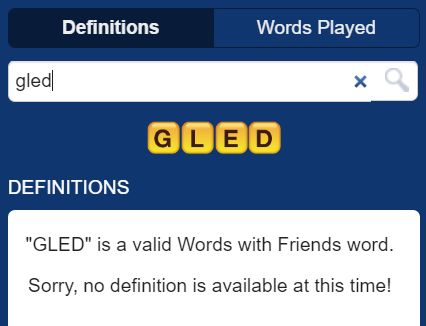
THE POPULAR GAME WORDS WITH FRIENDS has a dictionary all its own. For some reason, it includes quite a few Scots and Welsh words. In any case, success is largely trial and error. When I accidentally spell an actual word—GLED, in this case—I look it up in the WWF dictionary; I might want to use it again. I am informed that GLED “is a valid Words with Friends word.”
This happens all the time in WWF. It’s okay. I got my 48 points, so to my mind the subject is closed—unless I really want to know the meaning, in which case I Google the word. I sometimes pause to imagine a place where only “valid Words with Friends words” are spoken—”AARRGH! GLED HOOKME, AAL! TEUGH WHEEP. TREX?”—but then I let it go and move on.
But Words with Friends isn’t finished. After defining GLED as “a valid Words with Friends word,” it apologizes:
Sorry, no definition is available at this time!
Really! You don’t say! What a curious spot for an exclamation point! Might want to save your excitement till you’re ready to announce that, yes, at last, a definition has become available!
Superheroes!

Henry
AS SOON AS I LEARNED TO READ, I started devouring the comic strips in the evening and Sunday newspapers, including the lame ones (Henry, Nancy) and the ones that went way over my head (Pogo, the Katzenjammer Kids). I never understood why, in many of the strips, all the characters seemed to be shouting, all the time. Every sentence ended with an exclamation point, even if it was a question. “Hello!” “How are you?!” “Not so good!” “Oh!” “What’s up with you?!” “Not much!” “I see!”

In one vintage comic strip, Mary Worth—a kindly widow who was at least 50 when she was born, which puts her somewhere in her 130s—is wearing a dowdy hat and white cotton gloves, her brow furrowed in what I take to be a worried expression. Clearly, she is getting ready to go somewhere on a matter of grave importance.
The doorbell rings. Mary opens the door, and there, weeping, looking wretched but perfectly coiffed, is her attractive but despondent young friend Elaine, or Jeannine, or Delilah, who suspects that her husband is cheating on her but who has been in denial since 1955. (I was only 8 years old when I started reading Mary Worth, but it was pretty clear to me that Elaine, Jeannine, and Delilah were all married to the same worthless piece-of-shit traveling salesman.)
ELAINE: Mrs. Worth! You’re wearing your white gloves and goofy hat with a black net veil that makes it look like spiders are crawling on your forehead! You must be going out!
MARY: Yes, Elaine! I have an appointment with Dr. Edgemont!
ELAINE: Dr. Edgemont! The distinguished and handsome heart surgeon with a mysterious past! Mrs. Worth, are you all right?! Is something wrong with your heart?!
MARY: I’m fine, Elaine! Never better! As you can see, I have plenty of money though I’ve never worked a day in my life! I’m seeing a heart surgeon merely to pass the time! But I don’t have to leave right this minute! Do you have news about your faithless husband, Trent, who was seen trysting at L’Intimité with Delilah?! Please come in!
The people who wrote the Mary Worth comic strip evidently wanted us to think that what Mary and her friend were saying was critically important—more important than what Dr. Rex Morgan and his attractive nurse, June Gale, were discussing in the adjacent comic strip. In retaliation, Rex and June had to start exclaiming everything, too. The last time I read Li’l Abner, I noticed that every sentence ended with two exclamation points.

Rex Morgan, M.D.
Of course, they were all competing with real adventure comics—Dick Tracy, Steve Canyon, and others, in which stuff actually happened—kidnappings, plane crashes, bank robberies—whereas, in Mary Worth, it took an entire week to get Elaine from the doorstep to the living-room sofa and another week to find out if she took cream in her coffee. The only actual plot movement in Mary Worth; Rex Morgan, M.D.; Winnie Winkle; and other soap-opera-type series occurred in the Sunday funnies, when the strips were in color and occupied a third of a page instead of a few inches next to the crossword puzzle. With all that color and activity and dialogue, the shouting rose to a din!!!!
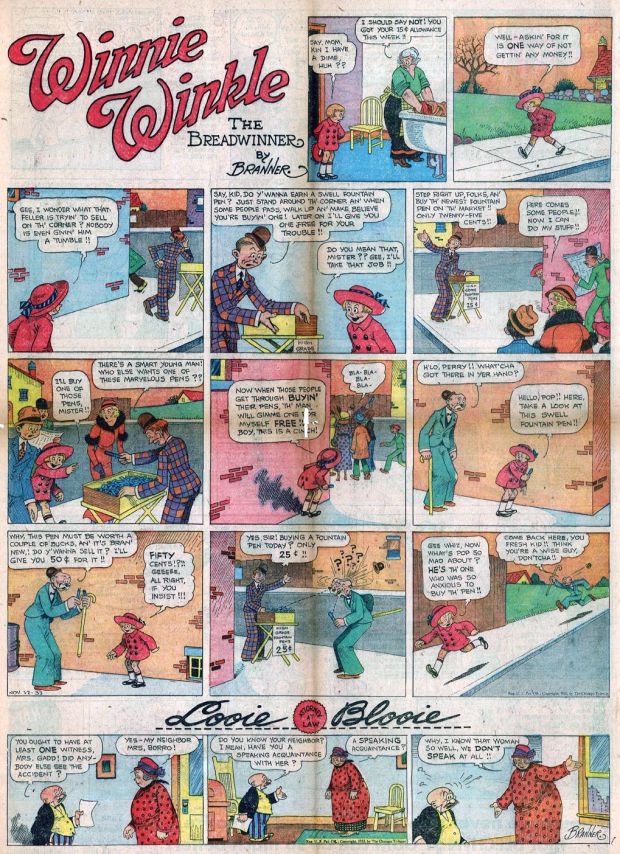 Act now! Operators are standing by!
Act now! Operators are standing by!
I HAVE IN FRONT OF ME A POSTCARD from the University of Arizona Alumni Association. It contains numerous sentences but no exclamation points. Nevertheless, I know that this is One Frigging Important Postcard. For one thing, it’s bright yellow. But besides that, just above my address there is a box with a wide black border surrounding the words—which are in bold capital letters—IMPORTANT ALUMNI VERIFICATION NOW DUE. On the other side is another box containing the words CONFIRMATION NECESSARY.
Dear Mrs. Campbell [the postcard reads], More than 80 percent of the University of Arizona alumni we’ve spoken with in regard to the verification project have made important revisions to their alumni data. This is the reason I urge you to call 1-866-555-5555 today.
If the postcard said, “Last year, more than 80 percent of the University of Arizona alumni ate mayonnaise. This is the reason I urge you to call…” it would make the same amount of sense. I can almost hear my dear mother’s voice: “Mary, if 80 percent of the University of Arizona alumni jumped off a cliff, would you jump off a cliff?”
But wait! There’s more!! “It’s critically important [the paragraph continues] to talk with each University of Arizona graduate.”
 Critically important for me to talk with each U of A graduate? Or for Melinda B—, the Alumni Association president, whose name appears at the bottom of the postcard? Either way, I’m sort of busy. My toddler is spraying toilet-bowl cleaner on the cat, and a glop of the foam is on the finger she’s about to stick into her own nose. Is it okay if I take care of that before I call 1-866-555-5555? Although… Wow! I don’t know…. There’s another box around some bold type—upper and lower case, but the letters are HUGE—asking me nicely to “Please call 1-866-555-5555 (toll-free) to take care of this important matter today.” Still no exclamation point, but those letters are pretty big, and Melinda does say it’s important, and… Oh! Toll-free. Well, then. I’ll call 911 right now, and by the time the EMTs get here I’ll have finished talking to Melinda.
Critically important for me to talk with each U of A graduate? Or for Melinda B—, the Alumni Association president, whose name appears at the bottom of the postcard? Either way, I’m sort of busy. My toddler is spraying toilet-bowl cleaner on the cat, and a glop of the foam is on the finger she’s about to stick into her own nose. Is it okay if I take care of that before I call 1-866-555-5555? Although… Wow! I don’t know…. There’s another box around some bold type—upper and lower case, but the letters are HUGE—asking me nicely to “Please call 1-866-555-5555 (toll-free) to take care of this important matter today.” Still no exclamation point, but those letters are pretty big, and Melinda does say it’s important, and… Oh! Toll-free. Well, then. I’ll call 911 right now, and by the time the EMTs get here I’ll have finished talking to Melinda.
What’s in it for me?
ACTUALLY, I WON’T BE TALKING TO MELINDA but to someone at a company called Publishing Concepts, “a trusted partner of the University of Arizona Alumni Association.” This means that the Alumni Association has paid an obscene sum to an outside firm to compose this ill-judged attempt to coerce me into making a donation—ill-judged because (a) in 20 years I’ve never given the U of A Alumni Association a dime, and (b) the postcard is worse than a waste of time, ink, and yellow card stock; it’s offensive, and I’m not easily offended.
Ten years have passed since my last mammogram, and this yellow postcard that pretends to be from the University of Arizona Alumni Association but is mailed from Dallas, Texas, is telling me what’s critically important? No.
- “Critically important” is cleaning up the water supply in Flint, Michigan.
- “Critically important” is talking someone down from a suicide attempt.
- My mammogram is important, but I’d hardly say it’s critical.
Calling 1-866-555-5555 doesn’t even make my list of “things to do after I’ve read every book in the library, painted my house, sterilized the switch-plate covers, ironed all my clothes and hung them in the closet sorted by color, and achieved world peace.”
Even if you allow that vulgar marketing instruments have their uses and you judge the yellow postcard against similar solicitations rather than the Bible or Macbeth, the yellow postcard violates the first rule of marketing:
Tell me what’s in it for me.
Melissa, or whoever, gives me no incentive to comply. Do I care that 80 percent of my fellow alums have updated their information? Is it in my interest to “ensure that the upcoming University of Arizona alumni directory project is completely accurate and up to date”?

Roman-numeral converter at Google Play
Even if such perfection were possible, for all I care the upcoming University of Arizona alumni directory can be printed entirely in classical Latin. If it were, I’d buy it, just to see the phone numbers. Mine would be CDXXII-DCCXIX-MMCXXXIII.
The marketing drones who wrote my yellow postcard aren’t completely stupid, because they know that so many things are clamoring for our attention, claiming to be important, that if we have no clear purpose we might not rely on our own judgment. If they can convince us, even for a minute, that calling 1-866-555-5555 is more important than locking up the toxic household chemicals or taking our kids to the park or meditating or whatever it is that we know we should do but feel we don’t have time for, then they’ve got a good shot at getting our annual donation, which is what they really want. And if they’d just say so, I might cooperate. When I feel that they’re trying to deceive me, it just puts my back up.
VI; ILI; DI; Magnum, PI; mud in your eye; etc.
WE HAVE A SITUATION—I won’t even call it a problem—with language that I call verbal inflation or, when I want it to sound important, inflated linguistic importance (ILI). ILI occurs when words, phrases, and, yes, punctuation marks (often in combination with type styles) are overused and lose their shape, like old shoes, or lose their sharpness, like my mother’s expensive sewing shears that my brother and I always “borrowed” for cutting paper, which (according to my mother) dulled the blades, making the scissors unusable for sewing.
There really was a time when, to indicate that something was important, we simply said it was important. Now we add modifying words and phrases (“critically,” “extremely,” “beyond the reach of human understanding”), set the words in bold-face capital letters, italicized for good measure, and wrap them in a box.
Any more, to call a woman “pretty” is almost an insult. So, what did you think of my new girlfriend? She’s pretty. Pretty? Just pretty? Okay, she’s gorgeous. How gorgeous? Really gorgeous. Really, really, seriously, downright frigging, drop-dead, hose-me-down-and-hang-me-out-to-dry gorgeous.
The flip side of ILI, which I call disastrous insinuation [DI], is exemplified by the following:
Dear Ms. Campbell: Your recent MRI showed a small mass, called an incidentaloma, above your right kidney. The radiologist who read the MRI described the mass as “anomalous” and commented, “I’ve never seen anything like it. I wonder what it is.” If you’re wondering the same thing, you could try calling our office at your convenience to get on a waiting list to make an appointment for follow-up with one of our physicians or nurse practitioners. Good luck with that.
This sort of communication never arrives on a yellow postcard. Usually it comes in a plain white envelope. Half of these letters probably get mistaken for bills or solicitations and tossed in the recycling. You do recycle, right? Because you should. It’s critically important.
Do what you love
MY SISTER HAS ALZHEIMER’S DISEASE. She still recognizes me, and we have conversations that might appear normal to others, until they notice that it’s really just one conversation over and over, but my sister and I have a good time. She used to be a professional organizer. She wrote a book called Ready, Set, Organize. (I was coauthor of the second edition. That’s how important I am.)
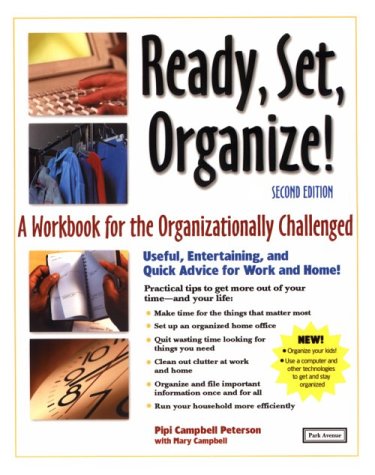 In Ready, Set, Organize, she describes the technique she used with consistent success. Briefly, it works like this:
In Ready, Set, Organize, she describes the technique she used with consistent success. Briefly, it works like this:
Before you can organize your schedule and your stuff, you have to define your values. When you figure out what’s important to you, and you develop goals and objectives around those values, only then can you make sensible, productive decisions about your time and your space. Without that structure, everything seems important, and the loudest and most persistent demands get the greatest share of attention. Whatever you’re doing, you have this nagging feeling that you should be doing something else, and you never really relax. You might even find yourself calling 1-866-555-5555 and giving money to a total stranger in Dallas, Texas, while your child eats toilet-bowl cleaner and Giant Leeches from Space devour your next-door neighbors.
So if you want take control of your life and gain mastery of your schedule, I suggest that you start by eliminating exclamation points. Just don’t use them. If nothing else, you’ll save on ink.
♥
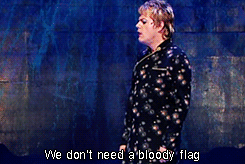 EDDIE IZZARD ON IMPORTANT COMMUNICATIONS (from “Wikipedia and iTunes,” Live at Madison Square Garden (2011), https://www.youtube.com/watch?v=N1ug9-rhSs4)
EDDIE IZZARD ON IMPORTANT COMMUNICATIONS (from “Wikipedia and iTunes,” Live at Madison Square Garden (2011), https://www.youtube.com/watch?v=N1ug9-rhSs4)
You’re tip-tapping away and the thing comes up and it says Would you like a software update? And you go Yeah! I don’t see why not.
Would you like to know details of the software update? And you go No! Or sometimes you go Yeah! … But before you can get the update, it says Sign a new agreement with iTunes.
… I have signed many agreements with iTunes. I don’t know what they want from us any more. Don’t they know we agree with them? They must be paranoid at iTunes, going We must ask them again, one more time, if they really, truly… we’ve asked them thirty-eight times, but one more time, just to make sure that they agree with us.
And they have made us liars. You cannot reprimand your children. No, Johnny, you said you didn’t have a biscuit but there’s crumbs all over your face and you did have a biscuit. You have lied.
[Johnny replies] But you said you had read the terms and conditions when you clicked that box, but it’s too quick for you to have read the terms and conditions.
The truth is, no one in this room has read the terms and conditions. No one in New York has read the terms and conditions. No one in the universe… even God has not read the terms and conditions. That’s probably the big gap between the beginning of the earth and when we effing turned up. He was reading the terms and conditions of the thing he just made.
Anything could be in the terms and conditions. We will take your buttocks and sell them to the Chinese…. We’re going to rearrange your toes and number them…. We’re going to put your underpants in hedges around the… and you get to the point where you want the update. You didn’t know what it was, but now you want the… Now give me the effing update! And then you get the update.
And nothing has changed.




Recent Comments